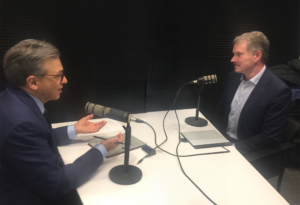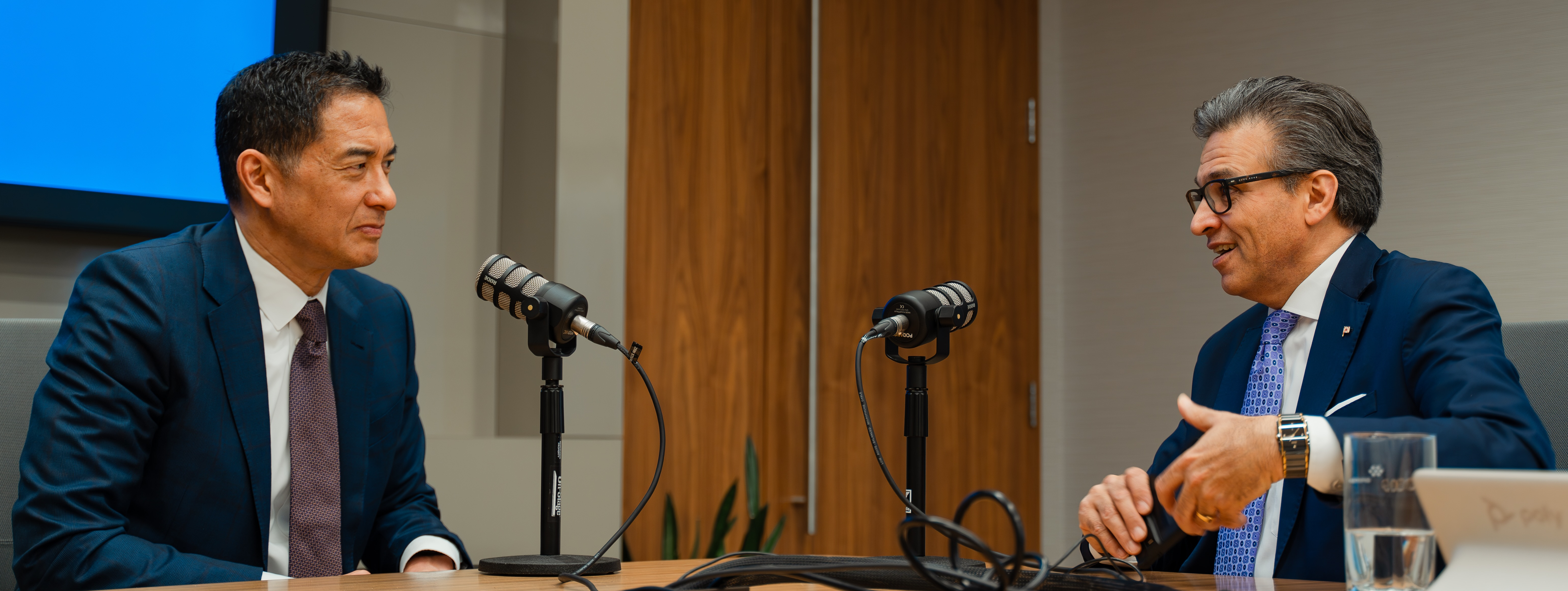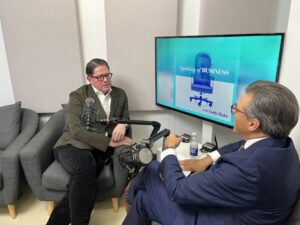
Scott Balfour has some simple career advice for his three sons: stay humble, work hard and be kind. It’s what he learned from his mother and grandmother and he maintains those “fundamental skills” have been the most important throughout his career.
Born and raised in Oakville, Ontario, Balfour spent a year working on the assembly line at the local Ford plant before returning to Laurier University to complete his degree. He went on to work in commercial banking, corporate finance and infrastructure development before pivoting to the energy sector, becoming president and CEO of Emera. The Halifax-headquartered energy company serves more than 2.5 million customers across Canada, the United States and the Caribbean.
At Emera, Balfour has been at the forefront of the industry’s transformation, overseeing the company’s shift towards more renewable energy sources and modernizing its energy mix. He has navigated the complexities of policy, regulation, and customer needs, all while maintaining a commitment to reliability, affordability, and environmental stewardship.
Listen to his full conversation – including his hopes for Canada’s future – on the Speaking of Business podcast with Goldy Hyder.
Scott Balfour
I think this is one of those moments for Canada where we finally recognize we’ve perhaps been a little too lazy around the relationship that we’ve had with an incredible partner in the U.S. but we need to control more of our own destiny
Goldy Hyder:
Welcome to Speaking of Business, conversations with innovators, entrepreneurs, and leaders. I’m Goldy Hyder, president and CEO of the Business Council of Canada. Today I’m in beautiful Halifax, Nova Scotia at the headquarters of Emera. The company provides energy for two and a half million customers in Canada, the United States and the Caribbean. Emera started from humble roots, when Nova Scotia Power was privatized in the late 1990s. It now employs more than 7,000 people and is a major player in the North American energy industry. Through constant innovation, it is modernizing its energy mix and finding new ways to provide clean, reliable, and affordable power to its clients. How are they doing it? And what’s next for Emera? Let’s find out. Scott Balfour is Emera’s president and CEO.
Welcome to the podcast, Scott.
Scott Balfour:
Happy to be here.
Goldy Hyder:
Well, let’s start with Emera. I’m sure it’s a well-known entity and a well-known brand. People probably see their invoices from Emera on some of their energy and so forth. But for the rest of the country and others who are listening to this in different parts of the world, what’s Emera?
Scott Balfour:
So Emera is obviously a Halifax headquartered company. We’re a public company. We trade in the Toronto Stock Exchange. We’re in the TSX60, meaning we’re one of the 60 largest public companies in Canada. And we own and operate a number of electric and gas utilities, regulated utilities. And as you covered, we have operations in Atlantic Canada, in two states in the U.S., in Florida and in New Mexico and also in the Caribbean, serving over two and a half million customers.
Goldy Hyder:
Well, I can’t help but pick up on the fact that you’re in the U.S. We’re meeting here on March the 28th, a few days after yet another round of being whacked by some more tariffs on auto. April 2nd is around the corner here. Is there any impact of all this activity, shall we call it, that’s taking place on your business?
Scott Balfour:
Yeah, it’s interesting. So you’re right, the U.S. is an important business for us and our roots are here in Nova Scotia. But today 70 per cent of our business is in the U.S. and most of that in fact is in Florida. And fortunately from an Emera perspective, we’re pretty insulated from the issues of tariffs. We operate local businesses that serve customers in those markets, regulated in those geographies. Of course, as a Canadian, I’m worried about the Canadian economy and that aspect of things. But from the perspective of Emera, we’re pretty insulated from any direct impacts from tariffs.
Goldy Hyder:
Can we talk a little bit about sort of energy flow? There’s this sense that it’s all in Canada and it all gets sent to the U.S. and they refine it and they move it along, or they just utilize it if we send it to them in that way. Is that how it really works?
Scott Balfour:
No. A lot of the oil and gas originates from Western Canada for it to get to Central Canada or Eastern Canada actually has to flow through the U.S. In fact, all of the natural gas that is used in Atlantic Canada, if it’s coming from Alberta, it has to flow through the U.S. to get here. And on the electricity side, the grids are interconnected and they’re not just interconnected between neighborhoods and cities and provinces. They’re interconnected between our two countries. And those interconnections are really important. In fact, we are regulated to make sure that we are maintaining reliability. So if there is a need or a shortage just south of the border, electricity flows from Canada to balance that need, and vice versa. And that happens every minute of every day, electricity is flowing back and forth all the time.
Goldy Hyder:
Right. So I guess we should be careful about any threats around what we would do with our energy because it sounds like you’d be hurting yourself at the other end.
Scott Balfour:
It’s a very sensitive topic for sure. And we need the electricity that comes from the U.S. to balance the system in Canada, and vice versa. And of course, there is a lot of electricity that originates in Ontario, in Labrador and in Quebec that actually does flow through to the U.S., serving U.S. customers.
Goldy Hyder:
You mentioned the impact on community. How many communities do you power?
Scott Balfour:
2.6 million customers. And for the most part, our geographies are predefined through regulation. So in the U.S. we serve the Hillsborough County and Tampa area. Tampa Electric is our operating utility there, and that serves about 800,000 customers in the Greater Tampa Area. And then we also have a gas utility in the state of Florida. We serve about half the gas customers in the state of Florida as well.
Goldy Hyder:
The word of the year so far seems to be uncertainty. How are you navigating uncertainty? Because even the way you described your business, it’ll have trickle effects
Scott Balfour:
For sure. In a way, our industry, our business is geared, has always been focused on managing risk and in that managing uncertainty. A lot of the investments we make are 30, 40, 50 year investments, as we’re investing in energy infrastructure and through the course of time, that means, we’re investing through different governments and different policies and all those things, of course today, that uncertainty and the pace of change, the degree of uncertainty seems at an unprecedented level. But at the end of the day, we stay focused on our customers. We make decisions based upon the information that we have in the moment. And of course, most of the decisions we make in our sector have to get reviewed by stakeholders, including regulators, so that we’re kind of all making these decisions together.
Goldy Hyder:
I want to talk about leadership in a crisis if I can. There is a lot of adversity that seems to be before us today. How are you navigating that aspect of it as a leader responsible for, I’ve often said it’s not 7,000 employees, there’s a multiple to that. How do you get through this as a leader?
Scott Balfour:
Yeah, it’s an excellent question. And I think, times of uncertainty make those moments more challenging. Whether it’s navigating through COVID as of course many have had to do or managing through this issue. A lot of it is being honest, giving people sort of a real perspective around things or helping people to think through the noise and think longer term about where things are going-
Goldy Hyder:
And these days separating fact and fiction.
Scott Balfour:
Well, exactly. And helping, make sure just to remind people to stay focused on the things that we can control, the things that matter most. And in our case, that means staying safe. We’re in an industry that obviously has high degrees of hazard to it as we’re dealing with electricity and natural gas, staying safe and staying focused on our customer. Those are the key messages. And again, trying to cut through the noise and focus on the long term.
Goldy Hyder:
What prepares you for this in life? Because there’s a sense that, for people who’ve achieved the success that you and many of the members of the Business Council have, life’s a straight line. It just goes straight up and this just comes to you naturally.
Scott Balfour:
Yeah, no, not so much. Not so much. It’s a journey. And look, all of us as leaders, you go through, younger in our careers we get to work with great leaders and we get to work with leaders that maybe aren’t so great. I tell my three boys who are younger and just at the front end of their careers, I say, look, you learn as much or more from the leaders that you’re working with that aren’t very good as you do for the ones that are. So I’ve had-
Goldy Hyder:
Oh, no question. Failure beats success in terms of learning.
Scott Balfour:
And I’ve been fortunate enough to have a balance of both in my career. And you pay attention to those things and you try and learn and then you develop your own style. But most importantly for me is staying true to yourself, staying humble, working hard, being kind. Some of those biggest lessons for me in leadership really came from my mom and my grandmother, being a good human along the way. And then, yeah, picking up some leadership skills along the way. But those core fundamental skills may be the most important.
Goldy Hyder:
Tell me a little bit more about any experience you remember from your mom or your grandmother where they had to set you straight on something? What comes to mind?
Scott Balfour:
Yeah, so many lessons. But there are times where you sort of have a decision to make, you’re looking for some guidance from your mom and they clearly are looking for you to make a decision different than the one that I really want to make, the choice I really want to make, maybe choice-
Goldy Hyder:
Some of us have been there, done that, I think.
Scott Balfour:
Right. But then you sort of get this message of this choice is yours and you know what the right thing to do is. And those moments where, sort of the I know what I want, but maybe not necessarily what I want isn’t necessarily the right thing to do. And always staying focused on trying to do the right thing, which means, sometimes you’re going a different direction than you thought. But the pressure, sort of that overlook from a parental unit or some guidepost often becomes a focal point that helps you to do the right thing even in those moments where you might be thinking something different.
Goldy Hyder:
It’s often said that adversity builds character. And so we’ve talked about corporate adversity and so forth. But I know as someone, you and I have spent a lot of time together, we’ve talked about our families and our countries and our own selves, you’ve had personal adversity. Can you talk about that a bit?
Scott Balfour:
Yeah, and you’re right, you go through these moments and through my career I’ve been very, very fortunate to have a number of situations and learnings and sort of work with companies that were on the verge of bankruptcy and finding their way through. But those moments of personal adversity sometimes can be the most impactful. And for me, I had a journey four years ago now kind of in the early parts of COVID where I ended up with unexpected news from a doctor that I had melanoma and melanoma that had gone past the skin. It was actually a very odd, unusual form of melanoma, which melanoma being a skin cancer, where it’s called melanoma with unknown primary. There is no evidence of skin cancer, but somehow in my lymph nodes I ended up with evidence of melanoma.
And so, we go through all the treatment and the course of doctors and trying to figure out what it is. Of course, that’s part of the journey and the uncertainty about knowing what’s going on and things aren’t good. I mean, I’m fortunate enough that I got great treatment and three and a half years on now, everything is good, but boy, it can-
Goldy Hyder:
It sobers you.
Scott Balfour:
… get your head spinning and knock you on your knees a little bit. It really does sober you and you realize, your humanity becomes very clear in those moments and those times where you have to, share the news that you just heard from the doctor with your wife and with your kids. Those are memorable moments.
Goldy Hyder:
But you’re doing well?
Scott Balfour:
I’m doing well.
Goldy Hyder:
Yeah.
Scott Balfour:
Thank you.
Goldy Hyder:
I’m so happy to hear that. Thanks for sharing that. I know, I remember when you called me, it was a few years ago now, and you mentioned that this is what you’re going through. I always remind people what you said to me, use sunscreen. Use sunscreen.
Scott Balfour:
And see a dermatologist.
Goldy Hyder:
Yeah, see a dermatologist and use sunscreen. It’s a great lesson. So thank you for sharing that with us.
Now, one of the things, and it may or may not be connected, I know you’re really active in your community. You were actually an Ontario guy, you were born and raised in Oakville, you went to school in Ontario and did much of your career out there. In fact, you weren’t even in this line of work. You were in investment banking and real estate and other things. Tell us, how did you end up here doing what you’re doing? And talk to me a little bit about this community of Halifax that you now call home.
Scott Balfour:
We feel privileged to live here. We moved here almost 13 years ago with three boys just before high school age. But we moved here and we had no family out East. In fact, Stella grew up in Hamilton. I grew up in Oakville. All our family is there. Stella had never been east of Quebec City when we moved here. I travel here lots for work. But yes, we both grew up there. Both went to Laurier University, both worked in banking, which is really where we met and then I worked in construction and infrastructure development for a while after the years in banking. And so I had the opportunity to come here and to travel and see how great it is, how great a community is, the culture here really is unique, special-
Goldy Hyder:
It is.
Scott Balfour:
… truthfully. And you notice it as soon as you get here, the people in the airport. And it’s just a different character, it’s got its own culture and it’s almost uber-Canadian here. There’s an extra humility I think, in this part of the world. And yet people still work really hard. So I love that. Kids spent their high school years here and are very tied to this community for sure.
Goldy Hyder:
Well, a big part of the community here is your own personal involvement in the local hospital. Why is that important to you?
Scott Balfour:
Well, connected thought to going through some health challenges and so similarly sort of family health through other family members. And so yeah, local hospital community here is important and it’s just a way of giving back. I’m proud and thankful for the ability to be in a place where I can do that.
Goldy Hyder:
The common threads in these podcasts is, like I said earlier, this assumption that somebody plots out their career on a map and it works out exactly the way that they were doing. Well again, I mentioned you came from construction and investing and manufacturing and you entered a totally new field. How did you get yourself to that place that says, I think I want to do this, I want to be in the energy space?
Scott Balfour:
Early in my career I started university, as I said, at Laurier and I took a year off between first and second year and I got a little lost trying to figure out what-
Goldy Hyder:
Going to let your boys do that?
Scott Balfour:
No.
Goldy Hyder:
Of course. Exactly.
Scott Balfour:
And I spent a year and I worked in the Ford plant in Oakville. I was a member of the UAW as it was back then on, the CAW.
Goldy Hyder:
Wow. That I didn’t know about you.
Scott Balfour:
Worked on the line.
Goldy Hyder:
That’s great.
Scott Balfour:
And I’d work very hard through, just before break and just at the end of the day in my one minute and 19 second workstation so that if I could get and work, sort of my tasks and get it done about, 30 seconds early, I could leave 30 seconds early in that last moment. Through that I made enough money to buy a computer and a stereo and also the commitment and the passion to go back to school. And so I did, I finished my degree. But in that moment I also made a 10 year plan as to what did I want to-
Goldy Hyder:
You made a 10 year plan.
Scott Balfour:
I made a 10 year plan.
Goldy Hyder:
How old were you?
Scott Balfour:
- And so I did, and of course the 10 year plan didn’t entirely unfold as it did, but I was-
Goldy Hyder:
I’m guessing Stella came along.
Scott Balfour:
Well, yeah. And kids. But so from there, because when I graduated university I really didn’t know what I wanted to do. I knew there were some themes that were interesting to me and one of the things that I remained focused on is keeping as many options open as I could. And so I went into commercial banking and I did commercial banking for a little while. That led to a corporate banking job that led to a special loans jobs that are focused on workouts. And at that time I just had the opportunity to join a client, a very small firm, became chief financial officer of a company that had a $7 million market cap. It shouldn’t have really been public, but it was. And was there for 17 years. That company grew to a $3 billion revenue company when I left and then had the opportunity to come out east. The construction company was building a lot of energy infrastructure. I got involved in the sector. I was chair of the Ontario Energy Association for a bit, so I got involved in the sector. So I knew a little bit about it. But mostly when I changed from construction to Emera, was really focused on culture and the kind of company that I wanted to be part of and found that here at Emera.
Goldy Hyder:
I want to go back to that year that you were at the auto plant at Ford and you were a member of the UAW. Is that formative? I mean you had a line of sight to an industry that’s so important to our country. We’re talking, as I said, at a time in which it’s under total attack, the tariffs. Labour is at the front and center of this. What do you remember about your time as a part of being in the labour?
Scott Balfour:
The labour aspect in those plants in its moment, it had its own character and culture and I was a kid coming in and so I was the lowest of low on the totem pole and you really had to earn your stripes and build relationships. And I remember I had the experience where at one point in time everybody dropped tools and started to walk out of the building and it’s like, what?
Goldy Hyder:
Where are we going?
Scott Balfour:
What’s going on? It was a wildcat strike in the moment and sort of seeing this dynamic and being fascinated by this dynamic between management and labour and the culture and it really interested me. The degree I was taking in school, of course was business, and so I had a little bit of that mindset. And so it was fascinating to me to watch this dynamic. Obviously I wasn’t part of any labour negotiations, but I saw the outcome from it and what can happen when things aren’t in a good place and seeing the focus on efficiency and time studies and all these things that it was a fascinating experience. I really enjoyed it. I wouldn’t trade it for anything.
Goldy Hyder:
Are there unionized labour here?
Scott Balfour:
There are.
Goldy Hyder:
There are.
Scott Balfour:
Yeah. So the IBEW of electricians, really the large component of our labour force, important component of our labour force. We’re really fortunate to have them as a partner. They’re critical to the work that we do.
Goldy Hyder:
Too often there’s this attempt to really drive a wedge between business leaders and labour leaders. What’s been your experience?
Scott Balfour:
We’ve seen that. In our company history, there’s been moments where that has been the case and there’s always going to be tensions, of course, in contract negotiations and the like. But if you can treat other parties like the true partners that they are, be honest brokers, be transparent, it is sort of the ability to get the work done that we need to do to be able to build a business, being able to do that in a way where we are partnering with our stakeholders, including the people that are doing the hard work in this business, are tools in hands and climbing poles and they’re such an important part of our business. Of course they’re partners, they’re teammates and we don’t think of them as any different than any other teammate. Whether unionized or not unionized, they’re teammates and important part of this company.
Goldy Hyder:
I’m happy to hear that because in the environment in which we’re operating that partnership is going to be very key to move on some of the things that Canada’s going to need to do as we go forward.
Now let me move to another issue actually that’s critically important and I know very important to you, and that’s of climate change itself. The energy industry is front and center, it’s undergoing rapid change. Give me a sense of some of the issues that you and others in the C-suites and industry players more broadly are wrestling with, the journey is complicated.
Scott Balfour:
Yeah, it really is. And so thank you for asking that question because the lens that we get to see, particularly as we’ve seen difference in policies between the U.S. and Canada around this. So yes, in Nova Scotia in the electricity industry one of the things we pay attention to is the number of storms. Our system here, for the most part up to 80 kilometers an hour the system is good. Above 80 kilometers an hour, trees start to fall into poles, we start to get outages. And so we measure of course, how many hours in a year do we see winds above 80 kilometers an hour. And over the last decade we’ve seen twice as many hours of winds over 80 kilometers an hour than we did the decade before.
Goldy Hyder:
Something’s happening.
Scott Balfour:
Something’s happening. And so of course, in our sector what we work to manage has been coined the energy trilemma. Is, how do we make sure that we’re investing in reliability and keep the system reliable? How do we invest in the journey to cleaner energy and how do we keep energy affordable? And the reality is doing two of those things at the same time is pretty straight forward. Doing all three at the same time is really hard.
Goldy Hyder:
And really it’s the affordability, isn’t it?
Scott Balfour:
And the affordability lens. And I think what’s been interesting in Nova Scotia, here, we’ve had an incredible journey from what had been a coal-based supply mix, of course it was one natural resources here, one of our natural resources here. Over 80 per cent of the energy was coal 25 years ago, 30 years ago.
Goldy Hyder:
What would it be today?
Scott Balfour:
Today there is more renewable energy on the system than there is coal. It’s sort of in the mid 30s. That low to mid 30s is coal today. A huge transformation that’s happened. Interestingly, when we bought Tampa Electric in 2016, there was no renewable energy on that system. Today we’ve built over 1,300 megawatts of solar.
The journey though is interesting is that the journey in Canada has all been because it has been mandated, there has been policy that’s been put in place either at the federal level or at the provincial level that is requiring either, well, a price on carbon or federal government has mandated the coal plants in Canada to close by 2030. The provincial government has said we want 80 per cent renewable energy by 2030. In the U.S.-
Goldy Hyder:
Are we anywhere near to get to that number?
Scott Balfour:
We can get there. 2030 is really ambitious. In the U.S., particularly in Florida, there’s no price on carbon, there’s no emission standard, there’s none of that. Everything is done just is it the most cost-effective for customers? And we’ve been able to demonstrate that adding solar into the system in Florida is more cost-effective for customers. My worry-
Goldy Hyder:
So you’re still trying to do the right thing down there?
Scott Balfour:
Absolutely.
Goldy Hyder:
You didn’t need to be forced to do it.
Scott Balfour:
That’s right. My worry has been in Canada is more about pace because the faster we drive this energy transition, the more expensive it’s going to be. At a time where we also need to be investing in reliability and resiliency to deal with more and more winds and storms and hurricanes.
Goldy Hyder:
And you have to bring your customer with you, right?
Scott Balfour:
Exactly right. And so in Canada, I would say a lot of the policy has been driven by cleaner first sort of carbon emission and then yes, reliability and affordability. But when we talk to our customers they’re like, no, no, reliability is first. Affordability-
Goldy Hyder:
Affordability is second.
Scott Balfour:
… is a very close second. And cleaner, yes, that’s great. It’s a third but it’s a distant third. And so I don’t think we’ve quite gotten-
Goldy Hyder:
Balance.
Scott Balfour:
… energy and climate policy right in Canada yet. One of the messages that I’ve been conveying. And of course it does have an impact on the cost of electricity, which matters a lot, particularly in this environment.
Goldy Hyder:
Do you think we should have… I mean, this is a country just abundantly rich in natural resources, but particularly in energy resources, do you think we should think about some kind of an energy industrial policy for Canada, especially as we wake up to this new reality that we’re going to have to pivot, we’re going to have to find new markets to sell our products to? Should we come at it holistically or let the provinces kind of…
Scott Balfour:
We need an industrial policy around energy and the policy really needs to start with how do we attract the investment and ease the path to be able to make these important investments in infrastructure as opposed to starting with the climate goal. We start with the ability to put policy in place that attracts investment with a climate goal in mind. That’s much better than starting with a climate goal and then figuring out, okay, will the money come to be able to make these investments? And if so, improving permitting times of course, really important. I know something that you’ve been advocating for for a long time.
Finally we have a conversation going on nationally about an energy corridor, which needs to include oil, gas, and electricity. We need more east-west infrastructure. It allows the system to be more efficient, but it also allows us to be able to get important resources, including our oil and gas, to market.
Goldy Hyder:
Setting aside how we got here, the fact that that’s happening is incredible given what we’ve seen over the last number of years. Are you hopeful?
Scott Balfour:
I am. And I think sometimes-
Goldy Hyder:
Because we talk a good game, right? Canadians are great at talking a good game. Can we do it?
Scott Balfour:
This is true, but it’s a little bit like we were chatting about earlier about individual careers and sometimes it’s those moments of hardship or sort of unexpected turmoil that can sort of steel you to do the right thing to grow and to become what we’re capable of becoming. I think this is one of those moments for Canada where we finally recognize we’ve perhaps been a little too lazy around the relationship that we’ve had with an incredible partner in the U.S. but we need to control more of our own destiny. We need to be able to do things that are not solely dependent upon one strong customer, one big market, but rather take a more holistic view, take some more self-control. I’m encouraged by the fact that politicians of all parties across the entirety of the country, federal, provincial, municipal, are all aligned around saying we need to do this. And that is sort of recognition of the problem and a path to a solution, that is a very encouraging first start.
Goldy Hyder:
Well there’s no question I don’t think I’ve ever seen Canadians this united, this emotional, this passionate and, frankly, this upset about where we find ourselves. So let’s hope we can do that pivot. Speaking of pivot, I’m going to go to Florida for a second because you mentioned Florida. So I want to ask you tell me about the manatees in Florida.
Scott Balfour:
It’s a really cool thing, Goldy, if you haven’t been down to Tampa recently, you should go. And so at one of the large generating units that we’ve got in Florida, we have three of them, one of them called Big Bend Station, just a little south of downtown Tampa. Of course with the electric generation plant, we use water to keep the equipment cool and we discharge that water, there’s an inlet there. That warm water is really popular with manatees. And we’ve built, we’ve invested in a manatee viewing center there. There’s a whole ecological center there where we’re growing coral among other things, all connected to this manatee viewing center. It’s a really cool spot. You can go in there and you can see hundreds of manatees. Now they don’t do much. These are very big animals that move very slowly, but it’s a really neat place to go and visit. It’s one of the things we’re really proud of as to how we’re giving back to the community and supporting the environment.
But what’s interesting is, that coal unit, we are increasingly retiring coal units and replacing them with much more efficient natural gas. It doesn’t heat as much water. There’s some times where we don’t need as many of those units on. We now have times where we need to run the units in order to maintain the warm water for the manatees. So it’s become really interesting. Anyway, so it is a big deal in Tampa. These manatees are really cool to see and you can see hundreds of them literally if you go at the right time of season.
Goldy Hyder:
Now it shouldn’t come to me as a surprise that you know so much about how all of this works. But as we discussed earlier, you were cold when you came into this business.
Scott Balfour:
True.
Goldy Hyder:
And I’m wondering the role that mentorship and sort of leadership has played in your career, others as leaders, to help get you to this place where you just love what you do and you found what it is that you’re supposed to be doing?
Scott Balfour:
Yeah, there’s no question. As I say, I’ve had the balance of great leaders that I’ve worked with and some that were trying hard but maybe not great. But some of those great ones, you do learn from that. I was fortunate all through my career, including in banking when I was a kid and my very early days in construction, same thing, just to be able to have the safe space and the support from people who took a chance on me, frankly, and gave me opportunities that I might not have otherwise even thought I was capable of. So very fortunate.
Goldy Hyder:
You’ve got three boys, I’ve got three girls, they’re obviously an important part of our lives. You’re busy. I’m busy. How have you done that work-life balance thing?
Scott Balfour:
You do have to focus on it. You really have to pick your spots. Two of my boys are now in Toronto. So when I’m in Toronto I work hard to try and find a way to connect if it’s just for a coffee or a beer or a dinner if I can. We’re fortunate one of the boys is here in Halifax. We get together with him more often. Stella, my wife, helps to make sure that I stay grounded and connected and engage. And she reminds me that just like maybe I don’t phone my dad probably as often as I should, probably means my boys probably might follow the same kind of behavior.
Goldy Hyder:
What goes around comes around.
Scott Balfour:
So it’s up to me to reach out and I do and I’m blessed to have a great relationship with all three boys that I do.
Goldy Hyder:
Wow, that’s wonderful to hear. When I talk about the boys or I think about my girls, I mean a lot of what we’re doing now is for them in terms of looking forward. What are your hopes for them and for Canada?
Scott Balfour:
The fundamental hope for our kids, of course, is to be happy above all else. To find what it is that gives them joy and friendship and the like. Thankfully all three are off to a good start on that front. On a more broader lens for the country and for our kids, our collective kids, my kids, your kids, is for them to be all they can be. Hope for the country to be all it can be. And I think we’ve gotten to a period of time in this country where we weren’t all we could be. We had much more opportunity than we’ve been able to capture I think. And so it’s sort of back to that hopeful, this time of crisis that we’re in now may allow us to get back and focus to all that we can be as a country because we have so much that we are blessed with in this country. It really is one of the best countries in the world to live in, and I think we’ve got some opportunity to be better than we are.
Goldy Hyder:
Now we get to the fun stuff, some rapid fire questions. Some people find this the toughest part. Favorite hockey team?
Scott Balfour:
Toronto Maple Leafs.
Goldy Hyder:
Oh that’s not the right answer.
Scott Balfour:
Sorry. Well, my second is the Tampa Lightning and one of the things that’s interesting-
Goldy Hyder:
All right, I can accept that one.
Scott Balfour:
… because of course know Tampa is our biggest business. As a Leaf fan, there were a few seasons there where if I stood back from the TV and squinted the blue and white uniform kind of looked like the Toronto Maple Leafs.
Goldy Hyder:
All right. They won more Cups, that’s for sure recently.
Scott Balfour:
That’s my point. I got to watch more playoff hockey.
Goldy Hyder:
What’s your favorite part of Halifax?
Scott Balfour:
Oh, downtown. The boardwalk here is really cool and one of the great things about Halifax is within 30 minutes you can be downtown, you can be out in the country and in trails you can be on the ocean, you can be in fresh water. The environment here, there’s just so much to offer within a small space.
Goldy Hyder:
Favorite food?
Scott Balfour:
The seafood here is awesome. Halibut, one of my favorite go-to dishes here.
Goldy Hyder:
Who has the best lobster roll?
Scott Balfour:
Good one. Bicycle Thief is pretty good. The Sou’Wester at Peggy’s Cove, little restaurant down at Peggy’s Cove. They actually have pretty good lobster rolls and pretty good fish and chips down there too.
Goldy Hyder:
Favorite place to travel?
Scott Balfour:
Italy. I married an Italian, been fortunate enough to enjoy some of my mother-in-law’s homemade Italian cooking. And I must confess, I kind of like Italian red wine too. So that combination has Italy right up there.
Goldy Hyder:
Terrific. How do you relax?
Scott Balfour:
I do enjoy travel.
Goldy Hyder:
I know you ski, hockey.
Scott Balfour:
I mostly enjoy golf. I ski, sort of a downhill ski. I telemark ski. Sort of this weird thing where your toes are connected to the ski but not the heel of your boot. So, enjoy that and spending time with kids.
Goldy Hyder:
You said you golf, any good?
Scott Balfour:
Well, I’m good for some shots. Bad for others.
Goldy Hyder:
Sounds like my game.
Scott Balfour:
Golf is hard unless you play a lot.
Goldy Hyder:
Got to be great courses around here.
Scott Balfour:
There is amazing golf in Nova Scotia. Amazing golf.
Goldy Hyder:
Well as Canadians think about traveling more in Canada, maybe they should take you up on that offer in the summer and come out this way.
Scott Balfour:
Absolutely.
Goldy Hyder:
What do you miss most about Ontario?
Scott Balfour:
Spring. I’d say there was a lot of great about Nova Scotia. Our falls are world-class. But the spring here it’s just gray a little longer. So we don’t quite get the early spring.
Goldy Hyder:
Yeah, that transition is tough. I hear you. I hear you.
Scott Balfour:
Yeah, that transition.
Goldy Hyder:
One piece of advice, last question here and then think carefully about this one because you’ve got three boys here, but they’re probably a little older. But one piece of advice you would give to your 20-year-old self.
Scott Balfour:
It’s be kind, work hard, help others to succeed. Even a work environment, make your boss look good. Be humble. Stay humble.
Goldy Hyder:
Well you are that person. So thank you so much for doing this, Scott, really appreciate it.
Scott Balfour:
Thank you, Goldy, and I’ve enjoyed it.
Goldy Hyder:
Scott Balfour is the president and CEO of Emera. We’ve heard a wide range of voices and perspectives throughout this season and I encourage you to listen to more of our conversations. Look for Speaking of Business wherever you get your podcasts, or find it on our website at thebusinesscouncil.ca/podcasts. That’s thebusinesscouncil.ca/podcasts. Please take the time to follow us or write a review. It helps others find our show.
Speaking of Business is a production of the Business Council of Canada. Our thanks to Tina Pittaway in Halifax for production help on this episode. And as always, thanks to Will McIntyre and the good people at Pop Up Podcasting in Ottawa. Until next time, I’m Goldy Hyder. Thanks for joining us.














